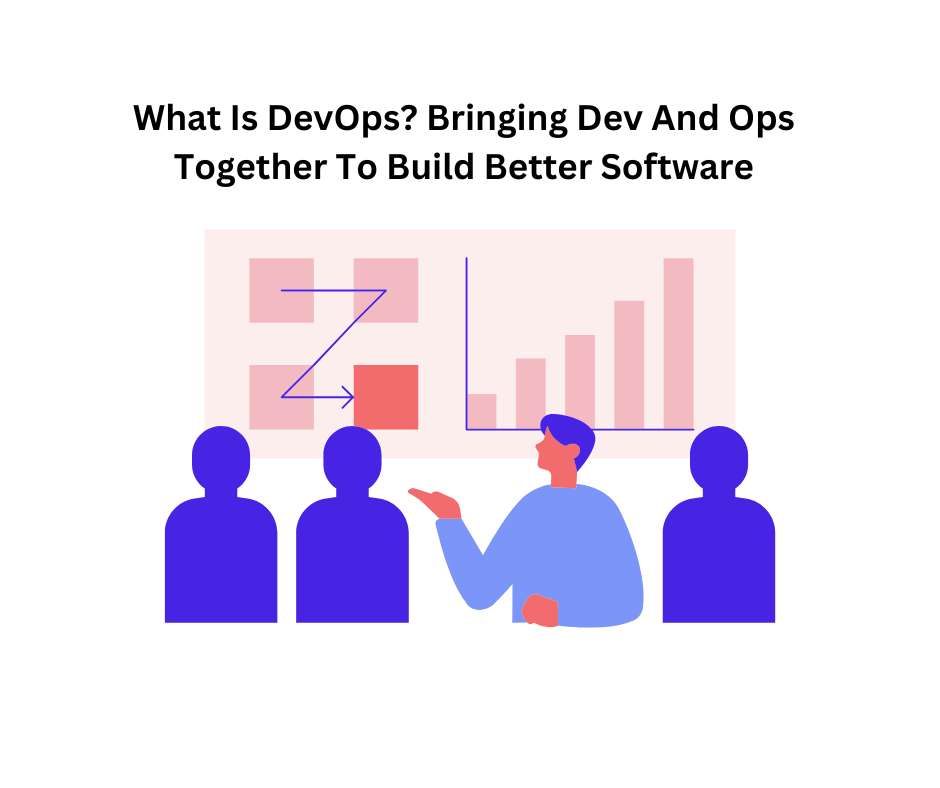What Is DevOps?
DevOps is a new approach to software development that brings together developers (Dev) and IT operations (Ops) teams. The approach emphasizes collaboration between formerly siloed roles such as development, IT operations, quality engineering, and security. This enables a single team to manage the entire application development lifecycle from development to testing, deployment, and operations.
The benefits of DevOps are numerous: it helps teams to produce superior quality software quickly and with more reliability; it allows a faster feedback loop; it reduces costs by streamlining processes; it improves communication between stakeholders across departments and more. But how does DevOps work?
At its core, DevOps is about people and processes, bringing them together to accelerate the pace of innovation. A key component of this is the role of the DevOps engineer – someone who understands both software development and system administration concepts to bridge the gap between these two worlds. The engineer is responsible for setting up an automated process that enables teams to deliver better code faster and ensure high-quality standards.
To make this possible, there are a number of tools and technologies used in DevOps such as continuous integration/continuous delivery (CI/CD), containers (such as Docker), Infrastructure-as-Code tools like Terraform or Ansible, monitoring solutions like Prometheus or Grafana for performance metric tracking, configuration management systems like Chef or Puppet for keeping environment configurations consistent across different nodes in an infrastructure setup. With all these pieces put together into an automated pipeline, from code commit all the way through production deployment, you can have confidence that your applications will be deployed reliably at scale with minimal input from engineers or ops staff members.
In addition to these traditional approaches, there are also modern trends around DevOps such as implementing machine learning models within CI/CD pipelines for automatic testing or automatically provisioning cloud infrastructure using serverless architectures on demand when certain conditions are met by applications running in production environments. These practices enable companies to rapidly innovate while ensuring stability at scale which would otherwise be impossible without dedicated DevOps engineering staff.
Finally, looking ahead, there will be use cases where AI technology can play a role within DevOps pipelines, predicting future performance bottlenecks based on historical data, automatically scaling cloud resources based on user activity patterns, and more. This allows developers not just to build great products but also maintain them over time with minimal effort.
How Dev And Ops Can Work Together To Produce Quality Software
Dev and Ops teams traditionally work separately in software development, with each team focusing on their own set of tasks. However, a growing trend in the industry brings both teams together to create better software – this is DevOps. Are you tired of traditional IT practices that don’t keep up with the speed of business? Look no further than Kelly Technologies’ DevOps Training in Hyderabad.
The key principle of DevOps is collaboration between developers and IT operations. This means that each team must communicate effectively and share knowledge to achieve success. Automation is also important for successful DevOps collaboration, as it can help speed up processes such as testing, deployment, quality assurance, and feedback loops to save time for both teams.
Quality assurance is a significant benefit when Dev and Ops work together – it increases the chances of successful product launches and customer satisfaction due to improved quality control practices being adopted by both teams. Other benefits include faster development cycles due to increased collaboration, improved customer engagement, greater agility and scalability for applications, reduced time-to-market for products or services, easier troubleshooting and problem resolution thanks to automated processes, increased security due to higher standards enacted by joint efforts, as well as automation of mundane tasks freeing up valuable human resources for more complex programming challenges or problem-solving initiatives.
To ensure success when applying DevOps methodologies across projects, it is important that all stakeholders understand their role within the process, have access to real-time data such as bug reports, use automated tools wherever possible such as CI/CD pipelines, maintain strong communication channels internally such as Slack or Microsoft Teams, track progress transparently via KPI dashboards where applicable so everyone can see where areas need improvement quickly, and act accordingly. With these measures in place, you should be well on your way towards producing high-quality software through effective use of DevOps practices across your organization.
Why DevOps Matters
DevOps is a term that you may have heard but many people are still unsure about what exactly it means and why it matters. In short, DevOps is the combination of development (Dev) and operations (Ops) to build better software faster. It focuses on empowering teams to better manage and enforce software development processes resulting in faster and more reliable updates. Let’s explore how DevOps can revolutionize the way we develop software.
DevOps encourages collaboration across departments like Development (Dev), Operations (Ops), Quality Engineering, and Security. This leads to improved communication throughout the organization, streamlining the process by creating a unified team that can collaborate and coordinate between roles more effectively than ever before. This opens up more opportunities for automation in software development and deployment, which leads to faster time-to-market for applications and services built with this methodology.
Additionally, when DevOps teams use proven middleware platforms such as Kubernetes or OpenShift, they are able to ensure scalability and reliability while reducing costs associated with manual steps involved in traditional siloed roles. The result is optimize application performance due to standardize development methodology coupled with clear communication protocols across all departments involve in developing a single application or service – from planning through delivery & operations. All processes are document into immutable processes that will be follow consistently over time within your organization, resulting in improve customer satisfaction and product quality.
Using an automate CI/CD pipeline also helps reduce time-to-market as code changes are quickly teste for errors by running tests against every new feature or bug fix before being deploy into a production environment. This ensures that any new features don’t break existing functionality, and security standards remain intact when rolling out updates or new features into a production environment.
DevOps enables organizations of any size to reduce costs while maximizing efficiency through increased automation capabilities and improved communication between Development & Operational teams leading to a streamlined software delivery process while ensuring scalability, reliability, customer satisfaction, and meeting security standards at every step of the way.
Understanding The Benefits Of Collaboration And Automation
DevOps is a term that has gained popularity recently. It is a combination of development and operations teams working collaboratively to create better software. The goal is to reduce time-to-market as well as improve product quality. Core concepts include collaboration between teams, automation processes, Infrastructure as Code (IaC), Containers, Cloud computing, security, availability, scalability, and continuous delivery of products. Collaboration helps to reduce silos while fostering communication throughout the product lifecycle. Implementing automation processes during this cycle enables faster release cycles, reducing time-to-market and improving product quality. Tools like IaC, Containers, and Cloud Computing streamline processes and increase system reliability while reducing human errors. Cultural differences within organizations may pose challenges when implementing DevOps, but understanding its benefits can unify people, process, and technology leading to faster software release cycles, improved product quality, and increased system reliability.
The Benefits Of Adopting DevOps
The world of software engineering is evolving at an increasing rate, and DevOps has become an integral part of it. Adopting DevOps can have a huge impact on the way your organization produces software and services. There are many benefits to adopting DevOps, from increased collaboration between developers and operations teams, to reducing the cycle time from development to production.
DevOps is a methodology that unites people, process, and technology for application planning, development, delivery, and operations. This helps teams execute ideas quickly while pursuing continuous deployment by bringing together formerly siloed roles such as development, IT operations, quality engineering, and security into one unified system of collaboration with shared goals and objectives.
By adopting DevOps practices, you can speed up innovation processes by allowing for faster delivery cycles with higher quality products that require less maintenance in the long run. This will help you create better customer experiences while also enhancing server scalability and availability due to its focus on automation of processes.
Conclusion
Adopting DevOps also encourages better communication between teams, leading to improved team morale and higher productivity rates overall throughout your organization. Thanks to its emphasis on automation, it increases visibility so issues can be identify more quickly and improves traceability when need too! The benefits of adopting DevOps are clear: higher efficiency with fewer errors resulting in improved customer experience, higher product quality delivered at high speed! This article getamagazines must have given you a clear understanding of the topic DevOps.












